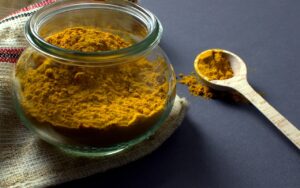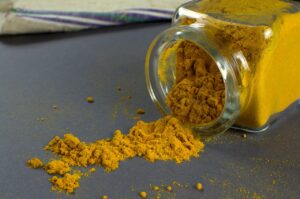Ever wondered if the spices in your kitchen could do more than just add flavor to your meals? I’ve been diving into the vibrant world of turmeric and its potential brain-boosting benefits. It turns out, this golden spice isn’t just for curries anymore; it’s making waves in the realm of cognitive health.
Recent studies are shining a light on the connection between turmeric and memory improvement, especially in older adults. With its active compound curcumin, turmeric is not just coloring our food but could also be enhancing our brain function. Stick with me as we explore the exciting research that’s uncovering how this common spice might just be a key ingredient for a sharper mind.
Turmeric: A Spice with Cognitive Benefits

Turmeric has long been celebrated for its wide range of health benefits, with one of the most intriguing roles it may play in boosting brain health—specifically in enhancing cognitive function and memory improvement. As someone who has delved into the intersection of nutrition and brain health for years, I’ve witnessed the rising interest in natural remedies for cognitive decline, and turmeric stands out as a significant player.
Turmeric and Memory Improvement
I’ve reviewed multiple studies examining turmeric’s impact on cognitive function, and the evidence pointing to its potential for memory enhancement is remarkable. It’s become clear that turmeric isn’t just a kitchen staple—it’s a potent source of the anti-inflammatory compound curcumin, which exhibits promising neuroprotective properties.
The essence of memory improvement revolves around strengthening the connections between brain cells. Turmeric’s effects on memory have been observed in various scientific research endeavors, which show that regular intake of curcumin—found in turmeric—can provide meaningful cognitive benefits for those experiencing mild memory problems.
In the world of geriatric psychiatry, Alzheimer’s disease remains a formidable challenge, with the search for effective interventions ongoing. Animal studies have indicated that taking curcumin supplements could lead to significant improvements in memory tests for diseases like Alzheimer’s. Curcumin does this, in part, by decreasing beta-amyloid plaques, known to cause chronic brain inflammation and play a detrimental role in Alzheimer’s disease progression. These studies also suggest that curcumin can prevent decreased microglia formation, cells that are vital for clearing amyloid beta plaques from the brain.
The idea of enhancing cognitive function with turmeric hits closer to home with human clinical trials. UCLA researchers identified that daily consumption of curcumin led to improved memory function in adults without dementia, and positron emission tomography confirmed less amyloid and tau signals in their brains, which are associated with Alzheimer’s disease.
It’s worth noting that while turmeric is available as a ground spice, using turmeric in high-concentration supplements is the usual method for those seeking these significant cognitive effects. Whether combatting neurodegenerative disorders or aiming to control anxiety, curcumin constitutes a relatively safe form of intervention, with further clinical trials needed to unravel its full potential.
Understanding the Curcumin Connection

The quest to enhance cognitive function has led me down various paths of scientific research, and perhaps one of the most intriguing is that of the turmeric root, specifically its active compound, curcumin. It’s astounding how often this spice, commonly found in curry, is linked with health benefits, especially in the realm of cognitive enhancement.
Turmeric and Memory Improvement
Recent studies have drawn a line connecting turmeric’s effects on memory to the potential it holds in preventing and managing neurodegenerative disorders, such as Alzheimer’s disease. It’s becoming increasingly clear that turmeric could play a significant role in boosting memory with turmeric, a notion that’s exciting for anyone touched by the devastation of cognitive decline.
One of the key ways in which curcumin exerts its influence is through its anti-inflammatory effects. Inflammation is a well-known player in the development of Alzheimer’s disease and other forms of dementia, where beta amyloid plaques and tau proteins wreak havoc in the brain. By interfering with inflammatory pathways, curcumin shows promise in not just providing meaningful cognitive benefits but also in reducing the buildup of these harmful proteins.
At the cellular level, curcumin has been shown to promote the health of brain cells, fostering an environment where cognitive functions can flourish. Experts from UCLA and other prestigious institutions have taken note of curcumin’s potential to mitigate mild memory problems and even contribute to significant improvements in memory function.
My investigation into the realm of turmeric and memory improvement has led me to examine the results of various clinical trials where participants taking curcumin demonstrated improved memory performance. These findings hold a beacon of hope for those grappling with cognitive decline, pointing towards a naturally derived solution lying within the humble turmeric root.
Diving deeper into the effects of curcumin, I’m captivated by how this natural compound could hold the key to enhanced brain function. The anti-inflammatory properties of curcumin go a long way in abating the inflammatory response that can lead to neurodegenerative disorders.
The Link Between Turmeric and Memory Improvement
As someone always on the lookout for ways to optimize health, turmeric and memory improvement have caught my attention in the scientific landscape. Not only does this vibrant yellow spice add zing to meals, but it also appears to offer promising cognitive benefits.
Turmeric’s Effects on Memory
Reports of turmeric’s impact on cognitive health are compelling. Among the compelling evidence is a UCLA study where individuals with mild memory complaints saw significant improvements in their cognitive function after taking curcumin supplements. Curcumin, the active component in turmeric, has been a highlight in geriatric psychiatry because of its potential in boosting memory.
Alzheimer’s disease, marked by amyloid and tau abnormalities, is one such neurodegenerative disorder where curcumin has shown promise. Studies suggest that curcumin exerts anti-inflammatory effects that might help reduce brain inflammation, which can lead to cognitive decline. It’s the anti-inflammatory and antioxidative properties that might be the keys to curcumin’s ability to improve brain function.
Enhancing Cognitive Function with Turmeric
Animal studies have laid the groundwork, showing that curcumin supplementation could lead to decreased formation of amyloid beta plaques, a hallmarker of Alzheimer’s disease. This data brings hope to finding a relatively safe form of therapy that provides meaningful cognitive benefits for those at risk.
For seniors grappling with mild memory problems, the regular incorporation of turmeric into their diet could be a game changer. Not only does it emphasize a natural, whole-foods approach, but scientific research also supports the positive effects turmeric can have on memory and overall brain health.
Curcumin supplements have become a focal point, given their targeted dosage and the emerging evidence from clinical trials on their positive effects on memory function. It’s worth contemplating how such natural interventions could reshape the way we address cognitive ailments and memory performance.
The evidence is not only promising for memory tests but also in understanding the broader scope of how curcumin might control anxiety and possibly even play a role in managing major depression. The anti-inflammatory effects on brain cells seem to extend far beyond just our cognition, potentially tapping into the fundamental mechanisms that govern mood and emotional regulation.
Exploring the Research

When delving into the effects turmeric and memory improvement share, it’s pivotal to assess the scientific studies that provide the backbone to these assertions.
Boosting Memory with Turmeric
For years, the golden spice turmeric has been a staple in culinary traditions, but recently, turmeric’s effects on memory have sparked interest in the field of geriatric psychiatry. One particular study stands out: participants with mild memory problems showed marked memory performance enhancements after regularly taking curcumin supplements—the main active component of turmeric. Notably, these individuals were not merely self-reporting improvements; their advances were verifiable through rigorous memory tests.
I keep an eye on the developments in this area, especially as the population ages and the search for methods to combat cognitive decline intensifies. Curcumin’s potential to provide meaningful cognitive benefits is a glimmer of hope for many.
Enhancing Cognitive Function with Curcumin
Diving deeper, the research suggests curcumin exerts protective anti-inflammatory effects on brain cells, which supports overall brain function. These effects could be key to their role in enhancing cognitive functions. The compound appears to not only reduce brain inflammation but also decrease beta-amyloid plaques—one of the primary pathological markers of Alzheimer’s Disease.
- Clinical trials have pointed out significant improvements in participants’ cognitive performance after taking curcumin.
- Studies find that curcumin may even decrease microglia formation—cells that can contribute to brain inflammation—thus supporting overall brain health.
Turmeric and Cognitive Enhancement in Alzheimer’s
When considering Alzheimer’s disease, a neurodegenerative disorder characterized by cognitive impairment, the spotlight turns to how curcumin impacts this condition. The accumulation of amyloid-beta and tau proteins is a fundamental feature of Alzheimer’s, and curcumin has been found to disrupt the formation of these harmful protein accumulations. By decreasing the volume of amyloid plaques and tau, curcumin could potentially slow the progression of Alzheimer’s disease, offering possible relief from cognitive decline.
How Turmeric Can Enhance Brain Function

As we unravel the world of brain health, turmeric emerges as a potent ally. This vibrant yellow spice, a staple in many kitchens, has been silently championing our cognitive function for centuries. Now, scientific research is lauding what traditional medicine has long observed—that turmeric, specifically its component curcumin, can play a significant role in boosting memory with turmeric and paving the way for enhanced clarity and mental acuity.
Turmeric and Memory Improvement
Among the many health benefits turmeric offers, one that’s particularly exciting is its potential to provide meaningful cognitive benefits. The UCLA study that has been referenced points to significant improvements in memory for individuals experiencing mild memory problems. This isn’t just promising news for those of us wanting to sharpen our minds; it’s a beacon of hope for individuals facing the daunting specter of neurodegenerative disorders like Alzheimer’s disease.
- Enhancing Cognitive Function with Turmeric
It turns out that turmeric’s effects on memory go beyond mere anecdotal evidence. Clinical trials reveal that regular consumption of curcumin supplements could lead to better cognitive performance and an enhancement in overall brain function. Curcumin’s powerful anti-inflammatory effects are pivotal in this aspect, as they help to reduce brain inflammation that is often linked with cognitive decline.
- The Science behind Memory and Curcumin
The link between curcumin and memory isn’t a simple one. It’s a multifaceted interaction that begins with curcumin’s ability to decrease amyloid beta plaques—those notorious proteins that accumulate in the brains of those with Alzheimer’s. Further, animal studies support that curcumin can lead to decreased microglia formation, which is another factor contributing to inflammation and cognitive issues in aging.
Moreover, taking curcumin regularly has been associated with better results on memory tests. This means that not only can it help prevent the loss of memory, but it can actively work to improve it. And what’s more? Curcumin has shown a promising potential to control anxiety and treat major depression, illustrating the diverse capabilities of this natural compound.
Harnessing the Power of Turmeric for a Sharper Mind

Turmeric and Memory Improvement
I’ve been fascinated by the health benefits of natural substances, and turmeric is no exception. With its anti-inflammatory properties and potential to provide meaningful cognitive benefits, it’s hard to overlook this vibrant root. Many individuals, myself included, are eager to understand how incorporating turmeric into our routines could aid in enhancing cognitive function. Through my research, I’ve discovered that turmeric could be a key player in boosting memory with turmeric and possibly even in warding off conditions like Alzheimer’s disease.
Turmeric’s effects on memory have become a topic of significant interest in the realm of geriatric psychiatry and brain health. Clinical trials have started to showcase significant improvements in memory performance among those who are taking curcumin supplements – the active ingredient in turmeric. It’s thrilling to think that a spice I frequently use to flavor my meals might also enhance my brain function.
Studies have shown that curcumin exerts its memory function magic by possibly reducing brain inflammation, which is often implicated in cognitive decline. The effects of curcumin don’t just stop there; researchers are examining how its consumption could lead to decreased microglia formation, cells that contribute to inflammation and are involved in the development of amyloid beta plaques – hallmarks of Alzheimer’s disease.
As someone who’s always on the lookout for natural ways to maintain a sharp mind, I’ve been particularly interested in how curcumin supplements might help with mild memory problems. The golden spice has been used in Ayurvedic medicine for centuries, and now with the additional backing by scientific research, it’s evident that there’s more than just anecdotal success.
Cognitive Function and Curcumin
When tuning up my diet for brain health, curcumin’s anti-inflammatory effects on brain cells caught my attention. These effects are a beacon of hope for bolstering cognitive functions even further. Memory tests in clinical settings have indicated that memory performance can be enhanced through consistent intake of curcumin. This could mean a whole new approach to managing cognitive ailments is on the horizon.
Final Thoughts
Turmeric’s promise in supporting cognitive health is not just a spice-filled tale. With studies like the one from UCLA backing the memory-boosting prowess of curcumin, it’s hard not to be optimistic about its place in brain health. I’m particularly encouraged by the potential it shows in not just memory improvement but also in mood regulation and neuroprotection. It’s clear that this golden spice, long revered in traditional medicine, is stepping into the light of modern science. For those of us looking to keep our minds sharp and memories intact, adding a dash of turmeric to our daily routine might just be the pinch of prevention worth considering.

